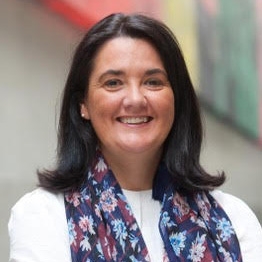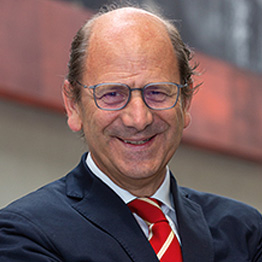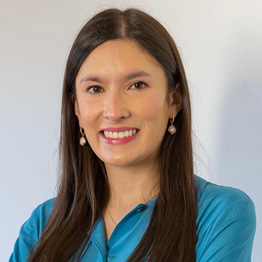The department of Public Communication (DCP) brings together professors and researchers in both theoretical and applied subjects that are concerned with providing cross-cutting conceptual foundations to the professor and researcher endeavors of the School of Communication at the University of Navarra.
The DCP has as mission statement a deep reflection on the fundamentals of communication in its various manifestations in order to provide solid starting points for communication as a field of knowledge.
This reflection, in the case of CPD, is deployed in disciplines such as Theory, History, Law, or Communication Ethics. They develop the axioms, foundations, evolution and personal and social operating principles of the reality of communication, especially in the public space. Likewise, the DCP includes in its scope subjects that deal with communication as a basic category of the social and, with this specific perspective, it deals with Political Communication, Global Communication, Public Opinion and the methodologies used to study the effects of the media and its contents.
The DCP is fundamentally interested in the configuring role that communication has in the public space and in the forms of social life that appear in it.
WORKSHOP
Opinion Pública y Participación Cívica Democrática: Ampliación de la Reflexión en las Agendas Públicas
June 18–19, 2026
Research activity

|
Publications |
Published in |
|
International Journal of Fashion Design, Technology and Education 16 (1), 1-13 |
|
|
Fashion Practice 15 (1), 36-63 |
|
|
speech performative and political lies during the FARC peace process |
Notebooks. info, 66-88 |
|
Chapter 2. Analysis of the Communications in AEIC Congresses 2008-2018. |
Espejo de Monografías de Comunicación Social, 43-61 |
|
Journal of Communication 22 (1), 333-354 |
|
|
The Constructive Role of the average in Hate Speech Controversies: The Valtònyc and Hasél Cases |
Journalism Practice 18 (2), 452-489 |
|
The constructive role of the average in hates speech controversies: the Valtònyc and Hasél cases |
Springer |
|
IBERIFIER Reports-Legal and Political Aspects of Disinformation in Portugal and Spain |
Publishing Services of the University of Navarra |
|
Algorithmic governance in public opinion: a methodological study on the perception of refugees. |
Miguel Hernández Communication Journal, 449-469 |
|
The systemic crises of the media in democratic Spain: was any time in the past a better time? |
Journalism, peripheries and marginality, 101-116 |
|
Publishing Services of the University of Navarra |
|
|
Anàlisi: quaderns de comunicació i cultura 68, 7-25 |
|
|
Post-truth and disinformation in democracy. How to combat them and strengthen the truth |
We are not islands: a tribute to Professor Jaime Nubiola, 215-234. |
|
The phenomenon of disinformation: reflections, cases and proposals, 13-36. |
|
|
Government of Spain. Ministry of the Presidency, Relations with the Courts and Democratic report . |
|
|
Journal of Communication 22 (1), 453-474 |
|
|
PROFESSIONAL ROLES AND FUNCTIONS OF JOURNALISM: EXPECTATIONS AND CONFIDENCE OF SPANIARDS |
Vivat Academia. Communication Magazine, 24-46 |
|
Economic perception and political polarization in times of crisis. |
More local power, 70-90 |
|
Fonseca, Journal of Communication, 211-235 |
|
|
Publishing Services. Complutense University of Madrid |
|
|
|
|
|
Anàlisi 68, 7-25 |
|
|
The audience of The Newsroom (HBO) in Spain: profiles, identification, and journalistic roles. |
|
|
University of Alicante. group de research Communication and Specific Audiences (COMPUBES) |
|
Title |
PhD Student |
Date |
Director |
|
News engagement patterns in Jordan and Saudi Arabia: a comparative study of news repertoires |
Mustafa Mohd, Ruba |
7/09/2023 |
Javier Serrano Puche |
|
The polarization of the public space in Spain. The speech of the elites and their press coverage between 2000 and 2020. |
Sierra Iso, Aurken |
19/12/2022 |
Jordi Rodríguez Virgili |
|
Marx, communicator: a response to the problem of the epistemological status of Karl Marx (1818-1883). |
De Pablo Contreras, Gabriel |
15/12/2022 |
Alejandro Navas |
|
Electoral communication, Internet and citizenship: The case of the first "connected" elections in Venezuela. |
Polanco Medina, Joslay |
9/12/2022 |
Jordi Rodríguez Virgili |
|
The consumption side of sustainable fashion: Understanding the attitude-behavior gap among Spanish consumers. |
Blas Riesgo, Silvia |
10/06/2022 |
Mónica Codina Blasco |
|
Cyberpolitics in Latin America: A model to measure its influence on critical instability |
Fernández Pérez, Carmen Beatriz |
9/12/2021 |
Jordi Rodríguez Virgili |
|
The influence of workplace TV drama series on social and professional expectations about the work of television journalists. The case of The Newsroom (HBO, 2012-2014). |
Novoa Jaso, María Fernanda |
5/07/2021 |
José Javier Sánchez Aranda |
|
Ecuador TV and other public media as propaganda tools in the Correa era (2007-2017) |
Panchana Macay, Allen Javier |
15/12/2020 |
Carlos Barrera del Barrio |
|
Hugo Chavez's populism and its effects on Venezuelan's political values |
Motta Giacomo, Alejandro |
9/10/2020 |
Jorge Rodríguez Virgili |
|
The journalistic and entrepreneurial initiatives of Juan Pablo de Villanueva |
Robles Izu, Javier |
4/09/2020 |
Carlos Barrera del Barrio |
|
Charles H. Cooley: an approach (instructions for a communicative theory of social) |
López-Escobar Fernández, Esteban |
7/07/2020 |
Manuel Martín Algarra |
|
Freedom at the center. Letter from Josemaría Escrivá to José Solís Ruiz in response to the Falangist press campaign against Opus Dei (1966). |
Tormo Ederra, Antonio |
24/06/2020 |
Jaime Nubiola Aguilar |
|
Communication of Spanish public administrations in the 21st Century |
Ballester Espinosa, Adrián |
31/01/2020 |
Jordi Rodríguez Virgili |
|
A Theoretical Modeling of the Relations between Political Society & Civic Society: A Relational Appproach to Political Marketing Practices of the 2013 Iranian Presidential Election. |
Naeimi, Mitra |
17/12/2018 |
Mercedes Montero Díaz |
|
Campaigns and disaffection. instructions for a conceptual reconstruction and rules and regulations of the advertising electoral by virtue of its democratic effects. |
Fierro Zamora, Pedro |
21/06/2018 |
Ana Azurmendi Adarraga |
|
History of Antena 3 Radio (1982-1994) |
Dobón Roux, Pilar |
25/09/2017 |
Carlos Barrera del Barrio |
|
The book, the "mass average" and the Republic of Technology according to the thought of Daniel J. Boorstin: a new perspective of Communication Theory. |
Scull Baptista, Morela |
12/05/2017 |
José Javier Sánchez Aranda |
|
From self-regulation to co-regulation. Study of its application in the main European countries. The Spanish case |
Gómez-Iglesias Rosón, Victorino |
20/12/2016 |
Mercedes Muñoz Saldaña |
|
The personalization of electoral campaigns in Spain and France: a comparative study of television commercials in the 21st century. |
Rebolledo De La Calle, Marta |
17/09/2016 |
Jordi Rodriguez Virgili |
|
Public diplomacy of European city networks. Analysis of the quality of internal relations |
Baptista Serna, Joyce |
27/06/2016 |
Mª Teresa la Porte Fernández-Alfaro |
|
Pedro J. Ramírez, from Diario 16 to The Foundation of El Mundo |
Ramos Rugel, Raquel |
5/02/2016 |
Carlos Barrera Del Barrio |
|
Communication and risk perception: Journalism in Spain on the anniversary of the Fukushima Daiichi nuclear accident. |
De Oliveira, Camila |
17/12/2015 |
Alejandro Navas |
|
Fashion communication in Spain. A sociocultural study of Telva magazine (1963-1975). |
Bueso Torres, Roberta |
27/11/2015 |
Mónica Codina Blanco |
|
Political persuasion. Theoretical and practical analysis of the concept and fundamentals of political communication. |
Rodríguez Andrés, Roberto |
18/11/2015 |
Mª José Canel Crespo |
|
Influence of Two and a Half Man on the decision to remain single. Theoretical-empirical approach to the power of placements in comedy programs. |
Zubieta Peniche, Pablo Arturo |
22/12/2014 |
José Javier Sánchez Aranda |
|
Social cybermovements. New communicative opportunities in the era of the Internet and the social Web, new possibilities for democratic transformation. |
Ortiz Galindo, Rocío |
21/11/2014 |
Alejandro Navas |
|
Initiating the Dialogue with Europe: Information in ABC, La Vanguardia and EFE during the exploratory talks (1964-1966) |
Cueto Luz, Carmen |
5/09/2014 |
Pedro Lozano Bartolozzi |
|
Application of rational choice theory to the study of East Asian international communication: The case of the Senkaku/Diaoyu Islands. |
López Aranguren, Juan Luis |
12/12/2013 |
Pedro Lozano Bartolozzi |
|
Contributions of the personalist Philosophy to the theory of communication: Conceptual considerations from the perspective of communicative expression. |
Huamán Flores, Fernando |
25/10/2013 |
Manuel Víctor Martín Algarra |
|
Communication and policy coherence. The case of the European Union's development policy. |
Nso (*) Roca, Sara Miriam |
27/09/2013 |
Mª Teresa La Porte |
Departmental management committee
Teaching

From department depends the teaching in the Degrees of Marketing, Journalism and Audiovisual Communication, and in the programs of postgraduate program Master's Degree in Political and Corporate Communication (MCPC), Master's Degree Executive in Fashion Business Management and the Master's Degree in Curatorial Studies.
DEGREE
POSTGRADUATE PROGRAM
Boarding students

A student intern is a student who joins department to collaborate in tasks of teaching and/or research, performing tasks that are compatible with their dedication to study and that contribute to their academic and professional training . Therefore, being student intern means participating in the university work , collaborating in the professor and research activity of the professors of the School of Communication.
Being student intern is an opportunity to acquire a solid and complete university training , as it provides an experience that allows acquiring or developing some of the skills, aptitudes and attitudes necessary to work with skill professionally. At the same time, having contact with the teaching and research tasks of the Departments is an opportunity to get to know from the inside the work that is carried out in the School and can be the entrance gateway to the degree program academic .












